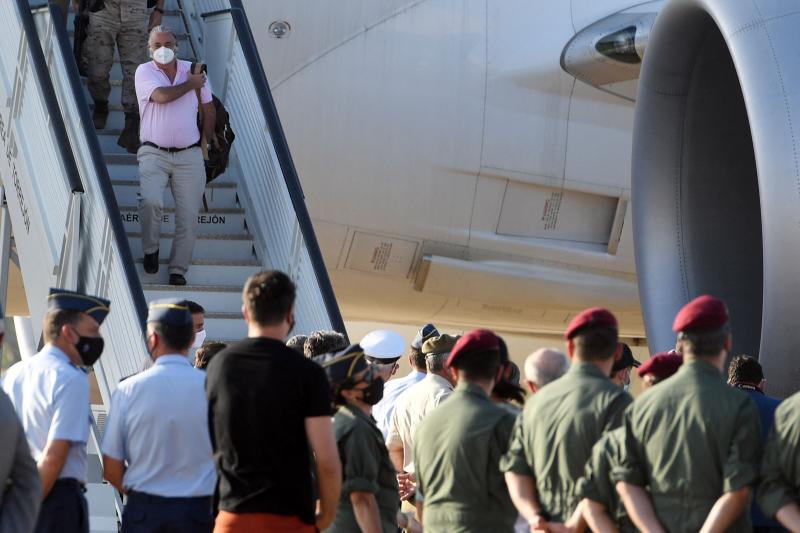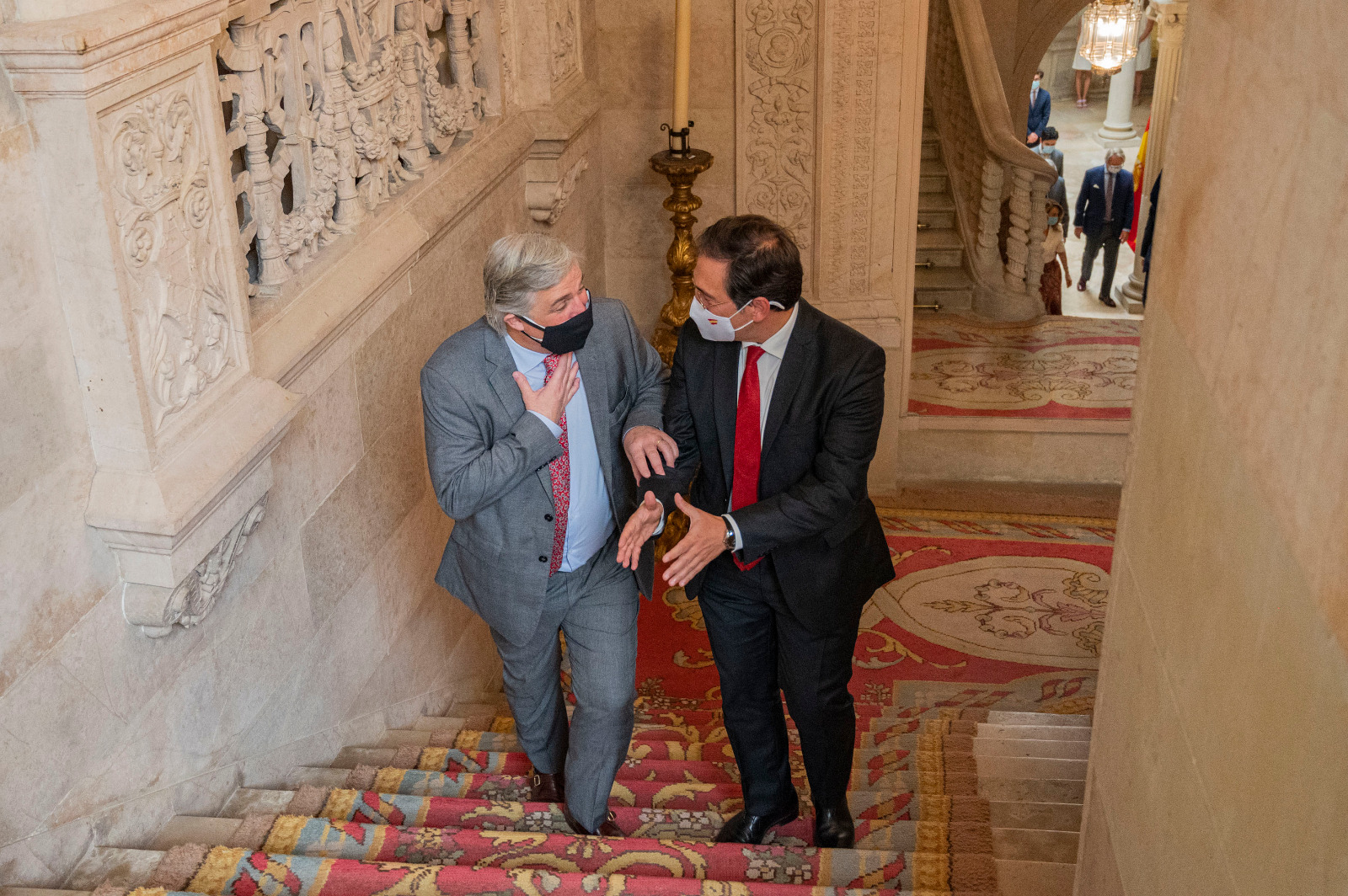The Diplomat
The Spanish personnel who took part in the evacuation operation in Afghanistan over the last ten days arrived yesterday afternoon at the Torrejón de Ardoz air base, having made it possible to get 2,206 Afghan collaborators and their families out of the country.
The members of the Spanish mission and the last Afghans evacuated arrived in an Air Europa plane and were received at the foot of the stairs by the President of the Government, Pedro Sánchez, and the Ministers of Foreign Affairs, José Manuel Albares, Defence, Margarita Robles, Interior, Fernando Grande Marlaska, and Immigration, José Luis Escrivá.
Once on the runway, where the Spaniards were reunited with their families, Sánchez and the rest of the members of the Executive, as well as the plane’s own staff, gave them a long round of applause.
A total of 195 people arrived on the plane: 82 Spanish military personnel; the ambassador to Afghanistan, Gabriel Ferrán; his ‘number two’, Paula Sánchez, and two other people from the embassy, who were the first to get off; 20 members of the National Police Corps (13 GEO and 7 from the Police Intervention Unit); 85 Afghan collaborators (16 with Spain, 50 from NATO and 19 from Portugal), and four Portuguese military personnel who boarded the plane at the last minute.
All had been flown from Kabul to Dubai airport on Thursday aboard Air Force A400M aircraft, which have been participating in the operation. Another 36 people, members of the Armed Forces (from the Air Force Wing-31 and the Air Take-off Support Squadron), will arrive tomorrow, Sunday, in the three A400M military aircraft deployed by Spain.
Since 19 August, with the first 53 evacuees, 11 flights have landed in Spain, and 2,206 people have been brought in, of whom 1,671 belong to the Spanish contingent, 21 to Portugal, 333 to the EU, 131 to the USA and 50 to NATO. Of these, 47% are women and 40% are minors.
Of those evacuated, a total of 1,717 people have applied for international protection in Spain, government sources told Europa Press. This is 83.7% of the 2,051 citizens who have arrived in the country in recent days. Of these, 884 were transferred on Thursday to the different centres or flats of the state reception system in up to fourteen autonomous communities.
Yesterday, in an appearance before journalists at Moncloa, Pedro Sánchez regretted that it had not been possible to get more people out, but he assured that Spain “is not going to disengage” from those who collaborated with our country and are still in Afghanistan.
He said that, after what he described as “an unprecedented operation”, “a second phase” was now beginning, in which work would continue to help these people to leave Afghanistan. Sánchez did not specify how this will be done, nor whether the government is willing to talk to the Taliban to do so, and limited himself to saying: “We are going to work slowly, discreetly”.
The head of the Executive expressed his satisfaction with the work done, saying that “Spain has done well” and that this has been recognised by international organisations and European institutions. “Spain has proudly represented the heart and soul of solidarity of our continent,” he said, alluding to the fact that the Torrejón base has become a “hub” for distributing Afghan refugees to other parts of the European Union, in addition to the fact that Rota and Morón de la Frontera are receiving Afghan collaborators from the United States.
Yesterday, two US military flights arrived at the Rota naval base with more than 800 Afghans (some 400 in each of them), who will remain there for a maximum of two weeks until they are taken to the United States or other countries.
Upon the arrival of the planes, according to the US Embassy in Madrid, a team of US government officials took charge of receiving, processing and meeting the basic needs of all the evacuees with extensive support from Spanish military, Red Cross and base volunteers.
In his appearance, the President of the Government did not hesitate to describe the withdrawal from Afghanistan as a “failure” after 20 years of international presence, although he vindicated the “seed of freedom, dignity and above all equality for women and girls”, sown in the country by the Spanish Armed Forces and aid workers over the last 20 years, and above all equality for the women and girls of Afghanistan.
Sánchez praised the work of public servants, the Armed Forces, the National Police, the Civil Guard, the foreign health service, aid workers, the Red Cross and numerous civil servants, who have made the evacuation operation possible, and said that he finds it “difficult to understand” that the PP can criticise the operation carried out.
He also defended the fact that the Government has kept the political forces informed through the Ministers of Foreign Affairs, José Manuel Albares, and of the Presidency and Relations with the Cortes, Félix Bolaños, who, in his opinion, were the ones who had to do so, thus rejecting the PP’s demands that he should be the one to give an account in the Congress of Deputies.
Yesterday, the PP spokesman in the Senate, Javier Maroto, insisted on demanding that Sánchez appear in Parliament, accusing him of “cowardice” for not doing so. And the deputy spokesman of the Popular Group in the Foreign Affairs Committee, Pablo Hispán, reproached the President of the Government for not saying in his press conference why he had not called the leader of the opposition, nor did he clarify whether there are any collaborators left in the Spanish army or how he is going to help the Afghan people.
The president of the PP, Pablo Casado, on his Twitter account thanked the Spanish “military, police and diplomats” for their defence of the freedom of Afghans for two decades and for risking their lives in the evacuation of Kabul. “Western democracies must coordinate a strategy to prevent jihadist terrorism from gaining momentum,” he said.






